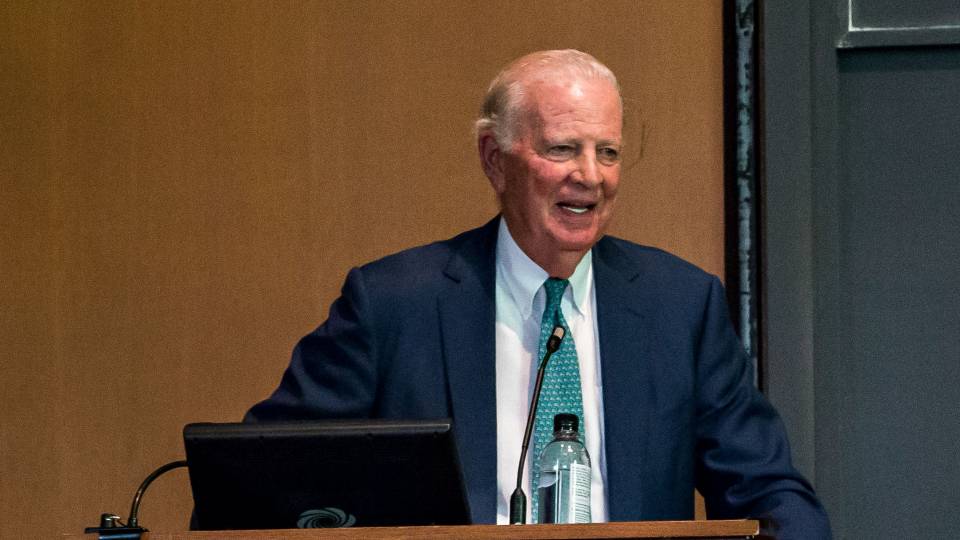Former Secretary of State James A. Baker III is donating the papers of his long career in politics and public service to Princeton University, where the rich collection of material documenting the end of the Cold War and other events in his distinguished career will join one of the nation’s premier public policy collections.
A ceremony to celebrate the gift will take place 4 p.m. Friday, May 31, in 50 McCosh Hall on the Princeton campus. Secretary Baker and Princeton University President Shirley M. Tilghman will make remarks.
Baker, a top-level official in the administrations of three U.S. presidents, was America’s chief diplomat at the end of the Cold War and witnessed the collapse of Communism.
“It was a time of revolution, war and peace,” Baker recalled. “The Berlin Wall fell, the Soviet Union dissolved, and the ideology of Communism died. In 1991, we liberated Kuwait from the Iraqi invasion, then followed with the Madrid Peace Conference -- the first time Israel and its Arab neighbors sat down together to negotiate.”
Tilghman said, “These papers are an extraordinary addition to Princeton’s public policy collection, and we could not be more appreciative. Cold War diplomacy is a strength and focus of our public policy collection. Secretary Baker’s gift provides an essential resource for historians and scholars, broadening our understanding of this pivotal time in history.”
“I selected Princeton as the home for these papers for two reasons,” Baker said. “The first was out of appreciation for the University, which was not only my alma mater, but also that of both my father and my daughter. The education I received at Princeton provided a strong foundation for my life, both as a private citizen and as a public servant.”
“The second reason was to take advantage of the University’s well-deserved reputation for organizing, cataloguing and preserving papers related to American foreign policy,” he said. “This will give scholars access to important papers that illuminate the historic transformation of the international system at the end of the Cold War.”
Baker, a member of Princeton’s Class of 1952 and a former member of the University’s Board of Trustees, is returning to the campus this weekend to celebrate his 50th reunion. He was also chosen by the Class of 2002 to give the Class Day address, 10:30 a.m. Monday, June 3.
Baker served as secretary of state under President George H. W. Bush from 1989 to 1992. He held a number of other important national positions, including secretary of the treasury under President Reagan, White House chief of staff under presidents Reagan and Bush, and undersecretary of commerce under President Ford. He also played a leading role in the election campaigns of those three presidents.
University Archivist Ben Primer said Baker’s collection will be very helpful to historians as they turn their attention to the closing decades of the 20th century. “Baker stands astride two eras,” Primer said. “When he joined the Reagan administration in 1981, Leonid Brezhnev ruled the Soviet Union and the world was dominated by superpower rivalries. When he left the Bush White House in 1993, the U.S.S.R. was a thing of the past and the arms race was over. We are delighted that the Baker papers are coming to Princeton.”
Baker’s papers will be maintained at the Seeley G. Mudd Manuscript Library, which already houses the papers of two other secretaries of state: Robert Lansing (1915-1920) and John Foster Dulles (1953-1959).
Over the next three years, archivists at the Mudd Library will organize the papers to ensure their preservation and usability. The collection will be closed to researchers during this time. Additional papers belonging to Baker, as well as records from various departments of government relating to his work, will be added to the collection as they become available.
The Mudd Library is a state-of-the-art facility that houses about 27,000 feet of archival documents and hosts about 2,000 researchers each year. Its 20th-century public policy collection has been hailed as one of the most comprehensive collections of its kind in the country and has been widely used by students of American statecraft, social and economic policy, and jurisprudence.
For additional information about the library, phone (609) 258-6345, visit the library’s Web site(Link is external) or send e-mail to mudd@princeton.edu .
Contact: Marilyn Marks (609) 258-3601
